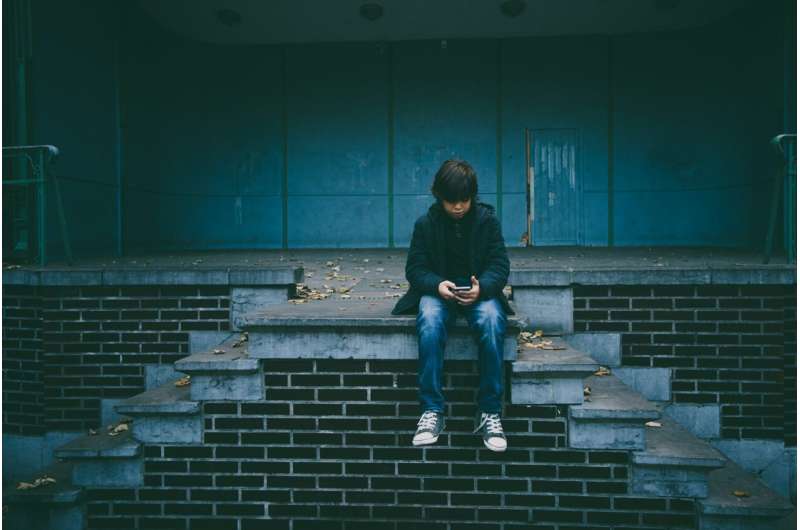This article has been reviewed according to Science X's editorial process and policies. Editors have highlighted the following attributes while ensuring the content's credibility:
fact-checked
trusted source
proofread
New report shines a light on the scope and scale of teenage terrorism offenders for the first time

New research into children convicted of terrorism offenses in England and Wales has revealed a sharp rise in "homegrown" teenage terrorist activity, with extreme-right ideology fueling the majority of cases.
Authors, University of Southampton Criminology Lecturer, Dr. Gina Vale, and ISD (Institute for Strategic Dialogue) analyst Hannah Rose analyzed data spanning the last eight years to map trends in minors' ideological affiliations in this report, published by the International Center for the Study of Radicalization (ICSR) at King's College London.
The unique dataset presents the first in-depth research of child terrorist activity, providing vital insight into the roles played by young people in extremism and their routes into radicalization.
While no attack has been committed by a child in the U.K. to date, the researchers say the data shows children's support of terrorist networks is a new threat, and that late-stage foiled plots and transnational activism demonstrate the potential is there.
In the report "Childhood Innocence? Mapping Trends in Teenage Terrorism Offenders," they reveal that in the UK between 2016 and 2023:
- 43 individuals were convicted of terrorism offenses they committed as minors
- 42 were boys—with the youngest offender aged just 13
- Extreme-right activity was the most prevalent ideology, with 25 cases, compared to 16 convictions linked to Islamist activity, and two with unknown or unclear ideologies
Two clear waves of offending can be identified, with the first dominated by Islamist cases running concurrently with the peak of the Islamic State group's territorial "caliphate" until its collapse in 2018. The second wave is mostly made up of extreme-right cases and can be seen emerging from 2018.
Dr. Vale said, "Our research shows that children are not merely passive consumers of content created and shared by adult counterparts. Teenagers across the ideological spectrum have engaged as online innovators and influencers, and violent offline activists.
"Independently of adults, children have succeeded in producing terrorist propaganda, influencing their peers and adults towards violence, and preparing to engage in terroristic violence both domestically and abroad."
Rose said, "In an era of rising extremist youth activism, greater understanding and better response planning must be a priority for counter-terrorism scholars and practitioners.
"These findings highlight the need for concurrent responses to severe threats to the public and comprehensive educational programs which promote critical analysis skills and social cohesion, as well as the effective operationalization of the emergent digital regulation framework to hold social media companies to account for hosting illegal content."
The analysis shows that almost a third of the children were convicted of preparing an act of terrorism and there were attempts by seven children to travel independently to Syria and Afghanistan for the purpose of engaging in terrorism.
Eight children—five extreme-right and three Islamist—planned to commit domestic attacks on U.K. soil.
Exerting influence among peers, families, and international followers to their social media accounts, 11 minors were convicted of encouraging terrorism, one for providing training for terrorism, one for membership of a banned organization and one for inviting support for a banned organization.
The most common offense was the collection of terrorist content, as 26 minors were found to have engaged with violent extremist literature, downloaded operational materials, and even created their own propaganda,
Proportionally, more extreme-right than Islamist offenders pleaded not guilty, with many denouncing previously held views, citing adverse childhood experiences, explaining their isolation and desire to fit in with online ecosystems, and claiming childhood innocence.
The most common sentence was non-custodial, accompanied by a rehabilitative and monitoring order, which was handed down to 12 extreme-right, three Islamist and one other offender.
The report was launched at the International Center for the Study of Radicalization in the Department of War Studies at King's College, London, on Tuesday (14 November). Published alongside the report, the live dataset highlights the importance of data accessibility to encourage other researchers, practitioners, and agencies to collaborate to address the increasing trend in children's engagement in terrorism in the UK.
ICSR Co-Director Dr. Alexander Meleagrou-Hitchens said, "ICSR is proud to publish this ground-breaking research, which helps us better understand the ways British teenagers become involved in terrorism, and what can be done to help prevent this."
More information: Childhood Innocence? Mapping Trends in Teenage Terrorism Offenders. icsr.info/wp-content/uploads/2 … rorism-Offenders.pdf
Provided by University of Southampton




















